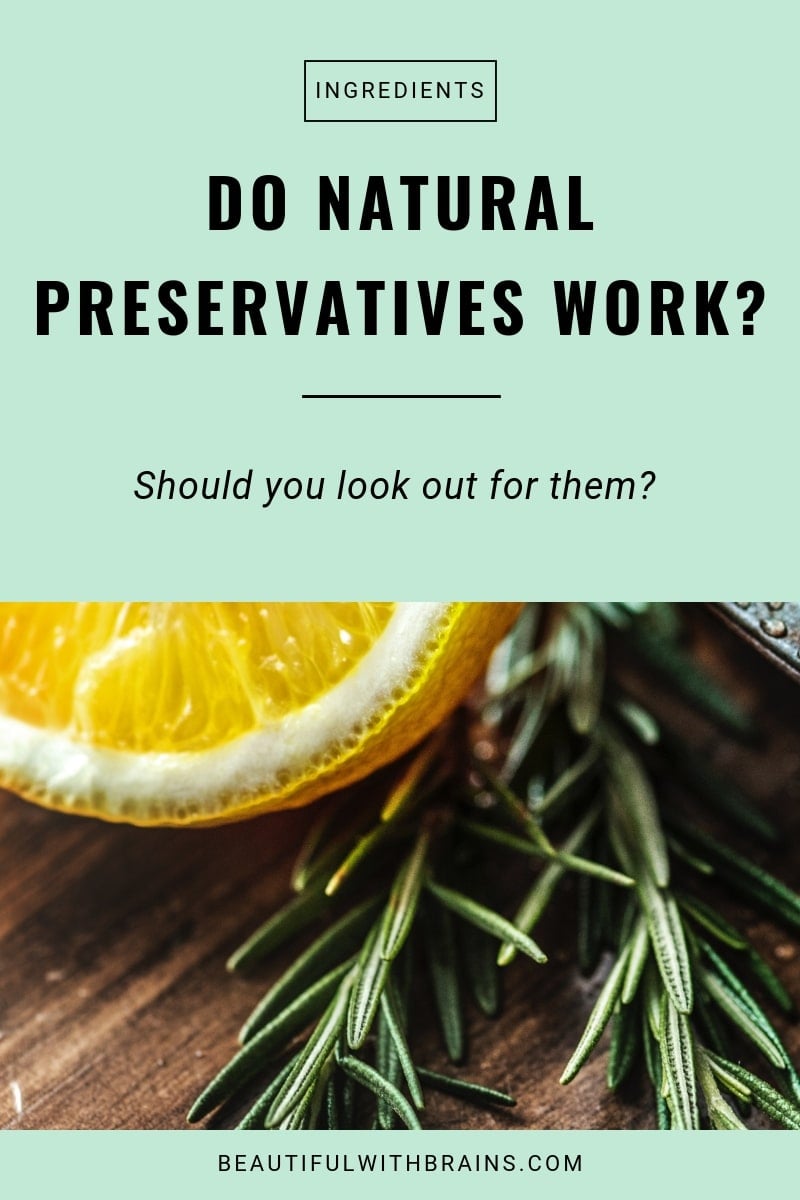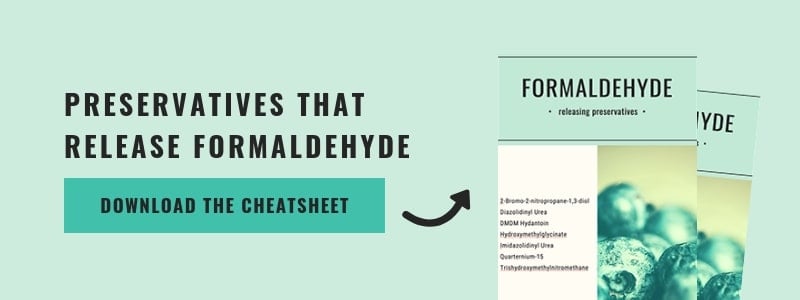
Preservatives are a necessary evil. If you don’t want fuzzy little bacteria to grow in your fave moisturizer, you need to use some sort of poison (for them, not us) to kill them off.
But, why do brands have to use stuff that releases formaldehyde or parabens, I hear you ask? Can’t they use something natural?
(Fun fact: parabens are naturally found in blueberries.)
Surely, there must be natural preservatives out there that are safe for us but hamrful for bacteria and fungi. Or not?
Here’s the list of the most common natural preservatives used in your skincare products (and what’s wrong with them):
Do You Know Some Preservatives Release Formaldehyde?
Sign up to my newsletter and receive the "preservatives that release formaldehyde" cheat sheet.
The Full List of The Most common types of natural preservatives
Good news: some plant extracts have antimicrobial and antifungal activity, so they can be used as preservatives.
Bad news: they’re a lot weaker than traditional preservatives.
Let’s take a look at the most common ones:
Natural Preservatives #1: Antioxidants
Did you know that the fats and oils in your cosmetics can oxidize (i.e. become rancid) when exposed to oxygen (by the way, oxygen is in water, too)?
Antioxidants, including Vitamin E and rosemary extract, slow down this oxidation process so that your products will last longer.
But, antioxidants can’t kill bacteria and fungi. They’ll keep your creams fresh and good as long as no bacteria find their way inside. But if one does, they can’t stop it from growing and giving you an infection.
Verdict: antioxidants aren’t proper natural preservatives. They help other antioxidants in the cream last longer, but don’t protect against germs and bacteria.
Related: Common Antioxidants In Skincare Products
Natural Preservatives #2: Essential Oils
Essential oils, including tea tree oil and neem oil, have antimicrobial properties, so they can kill bacteria.
The catch? They don’t kill a wide range of bacteria. You’ll be protected from some fuzzy creatures and completely exposed to the dangers of others.
There’s worse: to kill those few bacteria they can actually deal with, you need to use a big dollop of essential oils. In such high concentrations, they can seriously irritate your skin!
Verdict: when used as natural preservatives, essential oils are super harsh on your skin and can often cause irritations.
Natural Preservatives #3: Grapefruit seed extract
This one is controversial. The seeds and pulp of the grapefruit undergo a synthetic process, so the extract that comes out of them isn’t strictly natural. But, anything undergoes a synthetic process these days, so if you’re picky, you won’t be able to use anything. Just saying…
Grapefruit seed extract has some antimicrobial activity. So yes, it can kill bacteria.
The bad news? It’s weak. You can’t use it alone. It needs the help of other preservatives to do the job well.
Verdict: Grapefruit seed extract is a weak natural preservative. Don’t use it alone.
Are natural preservatives safe and effective?
Don’t get me wrong. I’m not saying natural preservatives are 100% useless. They work, but not as well as synthetic preservatives.
Natural preservatives have their own problems, too: you need to use a higher amount to kill a smaller range of bacteria. And even so, your natural products will spoil a lot sooner than your synthetic products. That’s why organic creams and toners have such shorter shelf lives!
Do You Know Some Preservatives Release Formaldehyde?
Sign up to my newsletter and receive the "preservatives that release formaldehyde" cheat sheet.
Tips for naturally preserved cosmetics
NOTE: The tips below apply to ALL beauty products. But, you must follow them even more religiously for natural, weakly-preserved products.
If you wanna go ahead and use natural beauty products, here are a few things to keep in mind:
- Always store your cosmetics away from light and heat: they make your products go bad faster.
- Go for products packaged in tubes. Avoid jars: they’re easier for bacteria to contaminate and their contents are often exposed to light and air (see previous tip).
- If you want to a cream housed in a jar, be quick and use a spatula: don’t use your fingers – they may contaminate the cream with bacteria.
Do you go out of your way to buy products with natural preservatives despite their shorter shelf life or are you ok with using synthetic ones? Leave a comment below and let me know.


very informative! I don’t think we can truly avoid preservatives and many of us do a lot more harmful things to our skins than using products with preservatives. but of course, non-harmful ingredients are always favorable 🙂
.-= Connie´s last blog ..Review: Shu Uemura UV Under Base Mousse SPF17 PA++ =-.
Oooh great tips! I did not know about the clear packaging. I guess makeup is kinda like tea leaves that way, huh? 🙂
Connie, I agree. Some synthetic preservatives pose some concerns but the amounts used in beauty products are so small that they shouldn’t cause any healthy problems. It’d be much worse if cosmetics didn’t contain preservatives at all. But of course, if they’d find out effective preservatives that have no potential side effects at all, that’d be great.
All Women Stalker, thanks, I’m glad you find the post helpful. Exposure to light could spoil your products and make them go bad, so it’s best to avoid see-through packaging whenever possible.
Some people use vitamin E as a preservative and it works to some extend. Whenever I have an all-natural moisturizer, I make sure to keep it in the fridge.
Dao, Vitamin E works by preventing the fats of oils in the product from oxidizing, thus making it last longer. However, being an antioxidant, it goes bad if exposed to light and air, so while it works, products that contain it don’t last as long as those that contain parabens. But if you’re fine with that, it’s a good natural alternative. And keeping natural products in the fridge is a good idea 🙂
Hi gio,
Very interesting post. Of course, natural is better than synthetics but there are its pros and cons as well, just like you have laid out.
Hence, be an informed consumer and choose wisely based on our skin needs and what one believe in and are ready to pay for. Natural may cost higher then synthetics, but can be vice versa too.
.-= Vonvon´s last blog ..Clinique Juiced Up Color Collection Spring 2010 – Eyeshadow Duo Swatches =-.
Vonvon I think both natural and synthetic ingredients have their pros and cons. And I agree with you. Products with natural preservatives have a shorter shelf life and can end up being too expensive in the long run, but if you’re aware of that and prefer natural preservatives over synthetic ones, then it’s alright to buy them. As long as you know their benefits and faults and make an informed decision, that’s the main thing.
Hello!
Im study now Cosmetology and I would like to say:
Each cosmetic is-safe, parabens do not harm us if anyone says otherwise they are nonsense!
Paulina, well said! I couldn’t agree with you more!